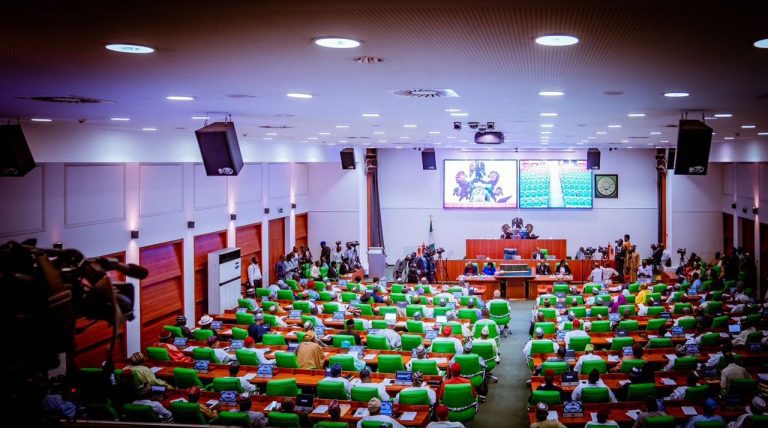Trending
House of Representatives Rejects Rotational Presidency
The House of Representatives on Tuesday turned down a bill seeking to make the rotation of the offices of the President and Vice President among Nigeria’s six geopolitical zones a constitutional requirement.

This proposed change was one of seven constitutional amendment bills listed for discussion during the plenary session chaired by Deputy Speaker Benjamin Kalu. In the end, all seven bills were rejected. However, the House agreed to revisit the bills individually during Wednesday’s sitting to assess their merits one by one.
To encourage smoother discussion, the House had earlier suspended its usual rules, allowing members to debate all the proposed constitutional amendments at once.
Among the seven, the bill on rotational presidency in Nigeria attracted the most attention and sparked a heated exchange of views.
Deputy Minority Leader, Aliyu Madaki, led the opposition to the bill. He argued that the idea of fair representation across Nigeria’s regions is already being handled by the Federal Character Commission.
“Rotation of the presidency should not be part of the Constitution,” Madaki said. “Political parties already have internal ways to ensure fairness in choosing candidates.”
Similarly, Sada Soli (APC, Katsina) criticized the bill, calling it “disingenuous.” He warned that forcing rotational leadership could reduce the quality of candidates and increase regional tension.
“Imposing a rotational presidency may not help the country,” Soli said. “It could create more ethnic division.”
However, some lawmakers supported the proposal. Shina Oyedeji (PDP, Oyo) said it would promote fairness and ease long-standing complaints among Nigeria’s ethnic groups. But he also pointed out that zoning could cause new problems.
“For example, if it’s the South-West’s turn, who gets it—Ogun or Oyo State?” Oyedeji asked.
Bello El-Rufai (APC, Kaduna) brought up constitutional concerns, especially in cases like the unexpected death of a sitting president.
“What if the president dies in office, like in 2010 with President Yar’Adua?” he asked. “Would the vice president have to step down to maintain the rotation agreement?”
El-Rufai added that writing such rules into the Constitution could limit the rights of Nigerians to run for office freely.
“No matter what law we pass, some people will still feel left out,” he said. “We shouldn’t set a dangerous precedent.”
Olumide Osoba (APC, Ogun) also spoke against the bill, saying it might interfere with the independence of political parties.
“It’s unique, but the Constitution shouldn’t tell parties how to choose their candidates,” Osoba said.
On the other hand, Minority Whip, Ali Isa, backed the bill. He said all six regions of Nigeria should get a fair chance to produce the president. He also suggested a similar rotation policy for governors within states.
“There are capable leaders across all regions,” Isa said. “Fairness is already part of the Federal Character principle. In 2027, we should let the North-East produce the president.”
Clement Jimbo (APC, Akwa Ibom) agreed, noting that the bill aimed to correct historical neglect of minority groups. He suggested a time limit for the policy—ending rotation once every zone has taken its turn.
READ MORE: JAMB to Review 2025 UTME Results Amid Complaints of Low Scores
Aside from the rotational presidency in Nigeria, the House rejected six other constitutional amendment bills.
One proposal aimed to take away the power of the Independent National Electoral Commission (INEC) to register and regulate political parties. It sought to hand that responsibility over to the Office of the Registrar-General of Political Parties. Lawmakers voted against it.
Another rejected bill sought to increase the minimum number of Federal High Court judges to 100 or more, depending on what the National Assembly may later decide.
The House also voted down a bill that aimed to give the Federal High Court the power to handle admiralty cases, including shipping, navigation on the River Niger and River Benue, and other waterways and federal ports.
Another bill proposed creating a new Ughelli East Local Government Area in Delta State. That too did not pass.
Lawmakers also rejected a proposal to make the Offices of State Auditors-General for Local Governments and the Federal Capital Territory Area Councils independent. The goal of that bill was to promote transparency and better financial management at the grassroots level.
Finally, the House dismissed a bill that would have allowed the National Judicial Council, together with the National Salaries, Incomes, and Wages Commission, to set and review the pay of judicial officers and court workers.
JOIN THE CONVERSATION→ Telegram | X/Twitter | Facebook | WhatsApp|WhatsApp Channel|Mobile App|Instagram















